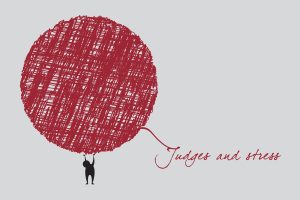Judicial Immunity Doesn’t Extend Matters of Stress and Well-Being

Judicial immunity does not extend to the mental health and substance use concerns that challenge legal professionals across the country. The ABA recently released a comprehensive survey report on judicial stress and wellness which indicated job stress has become a serious health concern within the judiciary.
- Approximately one-third of the judges surveyed reported fatigue and low energy (38.8%), sleep disturbance (36%), or disturbed attention and concentration (32.3%).
- One-fifth have at least one depressive symptom: not having initiative (22.9%); preoccupied with negative thoughts (20%); feeling work is no longer meaningful (17.8%); feeling they can’t wait for the day’s work to end (16.7%); and having a depressed mood (15.3%).
- Nineteen percent of judges responded that they had intrusive thoughts of traumatic images of people or evidence, which can be a symptom of anxiety.
- One of the most concerning findings was that 2.2 percent of judges “had thoughts of injuring myself or suicide” in the last year.
Judges, like all members of the legal profession, are subject to higher rates of and risks for substance use and mental health disorders. The professional, environmental, and occupational characteristics predispose members to the prevalence. From stressful day-to-day interactions and workplace conflict to stressors that are unique to judges, judges are constantly exposed to stress. The most common sources of stress were related to the importance and impact of decisions (79.7%), followed by a heavy docket of cases (73.2%). Then, the baseline risks and stressors are compounded by secondary traumatic stress, work-related burnout, compassion fatigue, and vicarious trauma experienced over prolonged periods of time. These heightened stress levels can cause negative outcomes in judges’ personal and professional lives such as reduced physical and mental health; reduced job satisfaction and performance; reduced professional efficacy; and perceptions of insecurity.
The study’s findings support the notion that a concerted effort to reduce judicial stress is necessary. This includes (i) educating the judiciary on the risks and impact of prolonged stress and the availability and benefits of implementing stress-relieving measures both systemically and personally and (ii) providing wellness trainings, counseling, and other supports for judges.
Judges typically hold themselves to high standards for being alert, attentive, and capable. On the flip side are concerns of external perceptions and the feelings of shame one might experience about being in less than optimal health. Virginia has not turned a blind eye to the struggles within the judiciary, creating the Virginia Lawyers Wellness Initiative, hiring our statewide Wellness Coordinator, promoting wellness programming for the judiciary, and changing our name to VJLAP to ensure clarity in understanding that our services are equally available to members of the judiciary.
VJLAP is available 24/7 to address your concerns. Additionally, it is important for judges to have time to open up with each other about the challenges in their profession. VJLAP is in the process of developing a judicial wellness support group to provide such a forum (please contact Jim Leffler if you would like to provide support in these efforts).
It is important to note that the ABA study was conducted before the pandemic and socio-political-enviro-disruptions from last year. Since then, judges have been under exponentially more stress in addressing courthouse, courtroom, and case concerns. Prolonged stress without an outlet is not good for anyone. VJLAP is here to support judges to protect their well-being and resiliency under all circumstances. Please reach out to each other and us.
Read more:
- “Stress and Resiliency in the U.S. Judiciary.” The Journal of the Professional Lawyer, ABA, 2020. Research Report.
- “Judges are stressed by their decisions, and 20% have at least one depressive symptom, survey finds.” ABA Journal, 2021. Article.
- “ABA releases comprehensive survey report revealing key drivers of judicial stress.” ABA, 2020. Article.
- “Judges and Stress: An Examination of Outcomes Predicted by the Model of Judicial Stress.” Judicature, 2018. Article
